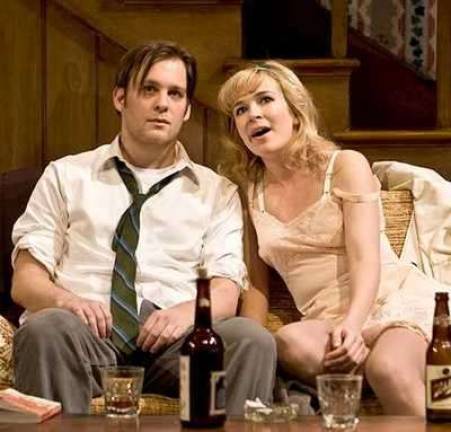Blunder Road

David Rabe's quest for Fire should probe further I don't know if there's a hill or a set of tracks in the nameless Midwestern town where Danny (Theo Stockmann) has returned since dropping out of college, but he's definitely on the low end or the wrong side of it. Having dropped out of college and moved back home with his German immigrant father Pop (a wonderful but ill-used Gordon Clapp), sleeping on a foldout couch in the cozy family living room and wearing the few garments he can shove into a meager closet, this aspiring writer doesn't have a whole lot of forward movement. He may be the central character in An Early History of Fire, the latest David Rabe play, but he's more likely to be found in a Bruce Springsteen song. As are the tramps he cavorts with in this townful of losers. Fire, directed by Jo Bonney of the New Group, offers little more than a slow simmer in its depiction of Danny's motley crew. It's 1962, and this group of twentysomethings, with their burgeoning knowledge of drugs and alcohol, clumsy experiences with sex and limited knowledge of the world around them, knows they're just spinning their wheels. Unfortunately, the play itself begins to feel stale as well. Fire is a character-driven piece, rather than a plot-fueled one, which makes it hard to be engaged when the characters lack any major discovery or changes. This is a shame, sine Rabe's works, like his Vietnam trilogy (The Basic Training of Pavlo Hummel, Sticks and Bones, Streamers) were vital theatrical works, and his druggie Hollywood manifesto Hurlyburly was acidic and cutting (The New Group mounted a revival of this Tony-winner seven seasons ago). Fire feels, well, tired by comparison. Danny meets Karen (Claire van der Boom), a college student back home visiting her wealthy family at a bus stop. She confounds him ? she's sexually liberated and literary in ways that intimidate but attract him, much like Karen herself and asks her out. Karen then invites him to a dinner with her family, and it's clear he's in over his head: he has to rely on Pop to pick up his suit from the cleaners (he doesn't), he arrives late to the dinner and nervously sits in his car for all to see, and borrows his friend's father's suit. Danny's clearly not a good fit in his present state, and things need to change. I'm pretty sure that's a message Rabe wants to extend to the country at large a half-century ago, but if he does, it's a thesis that requires further enlightenment. I believe there's a strong play within Fire, and as evidence, I turn to the first half of the second act, which seems to be little more than Danny and Karen hanging out with his lunkhead pals Terry (Jonny Orsini) and Jake (Dennis Staroselsky), and Shirley (Erin Darke), Jonny's high school girlfriend. Recently widowed, Shirley has turned to prostitution both to make a living and escape from life that has already both confined and defined her. It's a lazy night, full of pot and booze, and probably how these guys spend many a night. But it is also a vivid dissection of the life Danny and his friends know, one that is full of wonder but lacking in awe. These supporting actors, particularly Darke, who has the most with which to work, do yeoman's work with Rabe's material, making us care about these young adults with nowhere lives and allowing us to intuit everything they know and fear. Stockmann, too, gives a sturdy performance, but Elliott's scenes with just him and Van der Boom feel under-rehearsed and stagey in ways that fade when the whole ensemble (which also includes Devin Ratray as a friend of Pop's) is onstage. It's an odd conundrum ? the people that Danny seems determined to leave behind are the ones that keep us the most plugged in to Rabe's ambitious but tepid Fire. An Early History of Fire Acorn Theatre, Theatre Row, 410 West 42nd Street (between 9th and 10th Aves). Thru May 26. $61.25. http://www.thenewgroup.org/season3.htm